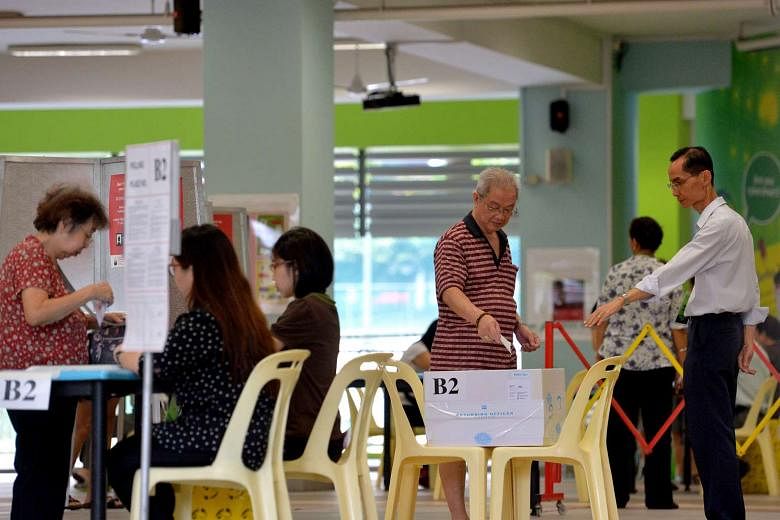For some reason, we seem to be able to surprise ourselves in every general election.
It's mostly a result of the legal structure here: Publishing polling results is illegal during the campaign period, and yet voting is compulsory, which gives the silent majority a decisive, largely unknown, power.
This means that in the 10 days leading up to the vote, the chattering political classes - among which I count myself - are effectively in an echo chamber which both over-stimulates and under-informs.
But Singapore is also a very young democracy, and this is only the 12th general election in its history. The Sept 11 vote was only the first time in our entire existence as an independent country that every parliamentary seat was contested, a phenomenon known elsewhere as an actual election.
In a sense, we are always in uncharted territory, feeling our way into political maturity. While every major experience in this awakening can take on the heady quality of irreversible, watershed transformation, they are usually anything but.
This was the accurate conclusion that the ruling People's Action Party (PAP) wisely took away from GE2011, when things were not going its way and Cassandras everywhere were prophesying an unstoppable tide of anti-PAP sentiment.
The ruling party instead held fast to the belief that the electorate was still largely winnable and proceeded to dig deep and pull off a stunning turnaround in policies and public perception.
It was duly rewarded at the ballot box on Sept 11, scoring a nationwide vote share of 69.9 per cent, its best performance in over a decade.
This is the kind of steadfast soul-searching and renewal that the opposition - and liberal-leaning Singaporeans who want to see greater openness and pluralism - must now engage in if it wants to remain relevant.
Concluding that it's futile to champion greater political contestation in Singapore or condemning Singaporeans for having Stockholm Syndrome with the PAP is an overly dramatic and defeatist reaction.
There is no inevitable tide in either direction at this stage of Singapore's political development, just an electorate with little patience for empty rhetoric.
In this GE, it was the PAP which had the better politicians, the better campaign and the better fortune, just like in the last GE, it was the Workers' Party (WP) which enjoyed a lucky confluence of factors.
Despite the magnitude of the national swing towards the PAP, the fact is that the makeup of Parliament remains unchanged from after GE2011. The one seat the WP lost was gained in the 2013 Punggol East by-election, and would have remained the party's through the Non-Constituency MP system had defeated candidate Lee Li Lian chosen to take it up.
After the dust settles and the new Parliament opens, GE2015 will be remembered as a status quo election. What it changed was our assumption that anything about Singapore politics right now can be assumed.
In the lead-up to the polls, I looked at five factors that would matter this GE.
Revisiting them now in the light of polling results suggests useful conclusions about what matters to this electorate, and how politicians positioning themselves for the next GE should react.
Of the five, the Lee Kuan Yew dividend, which I believed would pay off magnificently for the PAP, had the most straightforward effect on the polls. The ruling party's campaign returned again and again to the topic of exceptional leadership - and its centrality in Singapore's success.
From Prime Minister Lee Hsien Loong's invoking of Mr Lee's most famous words at a Raffles Place lunchtime rally, to the call for voters to bring into government new members of the fourth-generation leadership so that they can be groomed to take over, this topic had particular poignance and power in the wake of Mr Lee's death. In this way, the LKY dividend powered a large portion of that 9.8 percentage point swing towards the PAP, both directly and indirectly.
I can't help but think of Mr Lee's famous statement that if he ever saw Singapore going the wrong way, he would get up, "even from my sickbed, even if you are going to lower me into the grave".
But the LKY dividend is also the most ephemeral of the factors I identified, and requires no further parsing.
If the WP reveals itself to be a worthwhile opposition which can knuckle down and rectify its mistakes, as I hope it does, then the Aljunied-Hougang-Punggol East Town Council (AHPETC) saga should also be an ephemeral factor with little bearing on the next GE.
AHPETC's troubles were not enough for the PAP to win back Aljunied GRC, but they were enough to drive down the WP's winning margin to below 2 percentage points, and enough for voters in Punggol East to switch allegiances.
WP chairman Sylvia Lim said she did not think that AHPETC played a part in swaying voters, for the swing against the WP's vote share was less than the swing against other opposition parties.
If voters were concerned about the management of the town council, then the swing against the WP would have been larger than that against others, she said.
This is a puzzlingly self-serving interpretation of events. Over the past four years, the WP has had the largest opposition contingent in Parliament in Singapore history, and its rebuttals and proposals have received major national attention. Its politicians are as recognisable as some in the Cabinet.
That this massive advantage over other opposition parties was reduced to a marginal hedge against a national swing should be a disappointment to the party and its supporters - not a source of comfort.
The WP's razor-thin retention of Aljunied GRC is due more to the recognition among Aljunied voters that they bear a national responsibility to provide opposition in Parliament, than to any flippancy about AHPETC's governance.
Aljunied voters should be repaid for their steadfastness with a serious effort from the party to set its town council on the right track.
As the comprehensive rejection of the "vote opposition so the PAP works harder" argument this GE illustrates, the Singapore electorate does not play games with its politicians.
If the WP wants votes, it's up to its own hard work - not the PAP's.
What the opposition party's lacklustre performance this GE speaks to is an unease on the part of fair-minded voters that the WP has given them little to vote for in the past four years, despite its expanded presence and mandate.
This in contrast to the PAP, which has given voters little to vote against. In areas like population management, the Government not only moved quickly in the direction that most Singaporeans wanted, but it also did so in a consultative, communicative and humble way, asking Singaporeans to trust that political leaders are doing their best for the nation.
As the results of this GE show, the electorate by and large still maintains a healthy relationship with the PAP leadership, one that acknowledges the ruling party's honourable intentions and best efforts.
The people have no intention of being "mean parents" - an analogy used by PAP MP Denise Phua on the hustings - who scold a child for a report card that's very good, even if the score is not 100 per cent.


